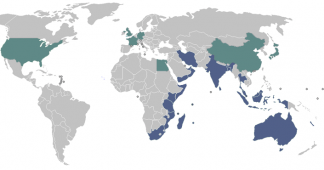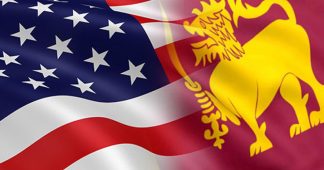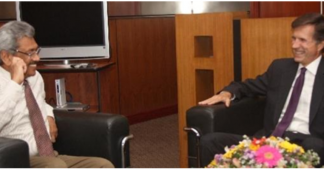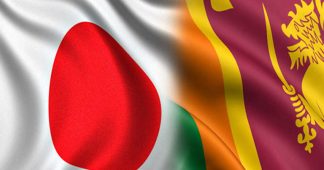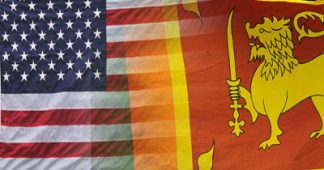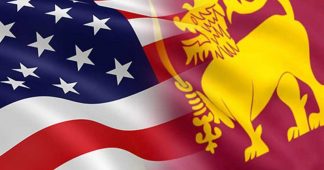By Lasanda Kurukulasuriya
Negotiations on controversial US agreements with Sri Lanka that were being carried out in extreme secrecy, have recently begun to face public outcry, after details were exposed in the media. At three different venues in Colombo on 9th August, the Acquisition & Cross Service Agreement (ACSA) – signed in August 2017, the Status of Forces Agreement (SOFA) – said to be ‘under negotiation’ since August 2018, and the Millennium Challenge Corporation grant (already approved by the MCC board)came under fire. The drafts of these agreements were nevermade public, never presented in parliament and hurried into their final stages, apparently bypassingeven President Maithripala Sirisena, who is the Minister of Defence.
At a discussion on the MCC compact at the Pathfinder Foundation last week, it was suggested by the Foundation’s chairman, who was moderating the event, that criticism of the $480 million grant was akin to ‘looking a gift horse in the mouth.’ This extraordinary assertion coming from former ambassador Bernard Goonetilleke drew fire from other panelists. Dr Palitha Kohona, former UN Permanent Representative in New Yorkquipped that this ‘gift horse’ might turn out to have no teeth at all, or decayed teeth, and it would be wise for the recipients to inspect the horse’s mouth since, in the end, they would be burdened with its care. One might add, in the light of information trickling out about the possible purposes of this ‘gift horse,’ it could turn out to be one of the ‘Trojan’ variety!
The MCC compact comprises a land project and a transport project that relate to radical changes in land use and ownership patterns and in the deployment of the country’s resources.It is only now, months after the approval of the MCC grant, that discussions such as the Pathfinder Foundation’s event, are being held.
In parliament on that same day the Opposition during an adjournment debate alleged that these three agreements violated the constitution as they had not been approved by the House. “The whole country is concerned about these agreements. If the members of Parliament cannot receive information about their contents who else can?” MEP leader Dinesh Gunewardenais reported to have protested.The ACSA and SOFA threatened regional peace and could jeopardise Sri Lanka’s Non-Aligned status, which was a cornerstone of its foreign policy, he alleged.
Even as the parliamentary debate went on, a letter warning of the dangers posed by these three agreements was being handed over by LSSP leader Prof. Tissa Vitarana at the South African High Commission in Colombo to be presented to the Secretary General of IORA (Indian Ocean Rim Association) and circulated among its member states. South Africa is the current chair of IORA, whose Working Group on Maritime Safety and Security ended a conference in Colombothat day.
The letter was signed by a cross-party group of 21 Opposition MPs,with others expected to sign on later.
Referring to the ‘top-priority’ status accorded by IORA to Maritime Safety and Security, the letter drew IORA’s attention to “a new situation that has arisen in Sri Lanka that is likely to pose a grave threat to regional and international peace and security, given its geostrategic location on the maritime route linking East and West.” It warned that the ‘three military or military-related agreements’ between the US and Sri Lanka together “form part of a larger project to transform Sri Lankain to a US strategic military hub in the Indian Ocean, a project that is incompatible with the Purpose and Principles of the Charter of the United Nations, and violates the sovereignty, independence and territorial integrity of Sri Lanka.”
Giving a cogent summary of the potentially harmful fallout of the agreements and how they violate the principles of IORA and the UN Charter, the letter appealed to IORA member states to urgently act in conformity with their obligations under the IORA Charter, and the UN Charter. It called for measures to:
- Ensure respect for, promote and safeguard the fundamental principles upon which international cooperation among states must be based;
- Evaluate the adverse consequences of the agreement for regional and international peace and security and communicate the results to the UN in accordance with relevant provisions of the Charter;
- Take appropriate action under Chapter VIII Article 52 of the UN Charter concerning regional arrangements;
- to Implement the UN Declaration of the Indian Ocean as a Zone of Peace adopted by the General Assembly resolution 2832 (XXVI); and to
- Take appropriate action under Chapter VI, Article 35 of the UN Charter which authorizes any member of the UN to bring to the attention of the Security Council or of the General Assembly, any dispute or any situation likely to endanger the maintenance of international peace and security.
According to a statement from the Ministry of Foreign Affairs in Colombo, the Sri Lanka-led IORA working group meeting attended by 22 member state representatives and secretariat officials, finalized a two-year work plan to move towards a collaborative framework on maritime safety and security, an integrated policy approach and a coordinated regional vision.
At a media briefing after handing over the letter at the South African high commission, Prof Vitarana elaborated on the international backdrop against which the US is pursuing agreements with Sri Lanka. The US controlled the Indian Ocean region through its military base in Diego Garcia. But with the recent ruling by the International Court of Justice – the UN’s highest court,saying that Britain must get out of the Chagos Islands (to which Diego Garcia belongs) and return them to Mauritius, the US will lose its lease-hold on that base. With the imminent loss of Diego Garcia, the Americans are eyeing Sri Lanka as a new launch-pad for military activities, he said.“Never before have we faced this kind of threat, not even under colonial rule,” the veteran Leftist who has been in politics since 1953 declared.
Former Permanent Representative to the UN in Geneva, Tamara Kunanayakam also addressing the media said, if it could be demonstrated that these agreements violated fundamentals of the UN Charter, then they were not valid.“Secret treaties also are not valid. We need to go into how this process took place” she said. “If the US is here it is not for the purpose of defending Sri Lanka. We are not under threat.” The US sees its hegemony challenged by three sets of threats, namely, China and Russia, Iran and North Korea, and ‘Global Terrorism.’ All of them are in the new region called ‘Indo-Pacific’ that they have created, she pointed out.“These agreements have to be rejected totally.” Kunanayakam also made the point that the ACSA, SOFA and MCC were connected.
While available information shows that the ACSA gives US forces access to the country, and the SOFA gives them privileges and immunities, the manner in which the MCC supports US defence objectives in Sri Lanka may not be immediately clear. MCC is marketed innocuously by both governments as a project to ‘reduce poverty through economic growth.’
An article on ‘US Naval Basing in Sri Lanka’ by David A Anderson and Anton Wijesekeracould help explain howthe MCC is linked to the US’s military project in Sri Lanka.Written from the USstandpoint, it says:“In establishing a naval base infrastructure is of major importance. Sri Lanka has 13 Airfields and four main ports. … Out of these, the most important are the airfields in Trincomalee and Katunayake, due to their proximity to the main shipping ports. … According to the World Port Index, the ports of Colombo and Trincomalee are highly conducive for naval basing. … However, the availability of infrastructure in these ports is not sufficient to meet the requirements of a fully fledged naval base.”We need to remember that the SOFA requires that “vessels and vehicles operated by or…for the U.S. Department of Defense may enter, exit, and move freely within the territory of Sri Lanka.”The article, published in smallwarsjournal.comdescribes the country’s existing road and rail transport system and says that “Overall, the availability of infrastructure in Sri Lanka demands a great deal of improvement for the establishment of a US naval base.”
Here’s where the transformations under the MCC might come into play. Improved road and rail infrastructure under the MCC’s transport segment, reportedly including an electric railway in a land corridor linking Trincomalee to Colombo, could be vital for speedy movement of military personnel and cargo, including weapons and supplies,between the two key ports and airfields. We may recall that in August 2018 the US tested what it called an‘air logistics hub’ operation involving these two locations.
The MCC also anticipates transforming land use and ownership patterns in Sri Lanka, increasing the ‘tradability of land.’ In combination with other new land laws (e.g. State Land [Special Provisions] Bill, Land Bank)the MCC land project will help pave the way for foreigners to buy large tracts of land without the checks that prevailed till now. Meanwhile the SOFA proposes that the US Department of Defence be permitted to ‘contract for services’ INCLUDING CONSTRUCTION. Construction of military related buildings and infrastructure would no doubt require access toland,and the necessary conditions for this would be created under the MCC’s land project.
The US embassy’s refrain that the US has ‘no plans for a permanent military base in Sri Lanka’ may be technically correct. But for the purpose of transforming the entirety of Sri Lanka into a ‘military logistics hub’ serving US objectives in the Indian Ocean region,it becomes clear that all three agreements – the ACSA, SOFA and MCC, need to be in place. It follows that all three must be rejected, as parts of a project that gravely threatens the sovereignty, independence and territorial independence of Sri Lanka.
